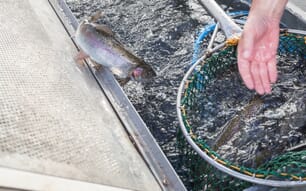The newly described species Salmo kottelati (Pictured. Credit Prof. Dr. Davut Turan), belongs to the Salmonidae family, which includes salmons, trouts, chars, graylings and freshwater whitefishes.
Salmonids include over 200 species, which have a high economic value because of their taste and famed sporting qualities.
The genus Salmo is widely distributed in rivers and streams of basins of the Marmara, Black, Aegean and Mediterranean seas. The genus is represented by 12 species in Turkey.
The new species is distinguished from the other members of genera by having fewer parr marks along lateral line, and a larger mouth gape and maxilla, which is a part of the fish jaw.
Although salmonids commonly live in mountain lakes, headwater and upper reaches of streams and rivers, some species spend long parts of their lives in the sea but return to the rivers and streams for reproduce. This migratory lifestyle is known as anadromous. Salmonids are predatory fishes feeding on small crustaceans, aquatic insects and also small fish.
In order to understand the rich genus diversity in Turkey, samples were collected from more than 200 localities throughout the country between 2004 and 2014.
The paper, published in the open access journal ZooKeys, focuses only on the Salmo species distributed in the Alakir Stream drainage, from where the new species was described.
The new species Salmo kottelati is named for Maurice Kottelat, who contributed to the knowledge of the fish fauna of Europe and Asia.
The new species inhabits cold and clear water, with moderate current, and gravel and pebble substrate. Its maximum known body length is 21cm, while the largest representative of the family can reach up to 2m in length.




